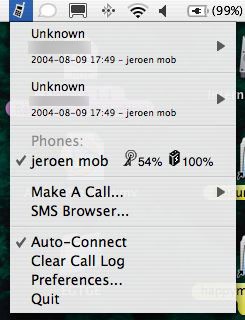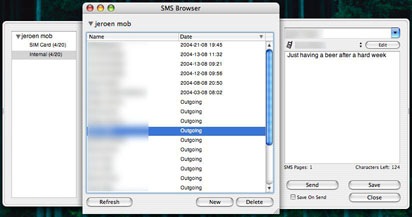Wednesday: Zealots, BluePhoneMenu and virtual memory explanation! |
8 September 2004 |
Zealots!
Every time I read comments following Mac news articles I find I am confronted by
Windows zealots spreading anti-Mac rubbish. On Mac news sites no less! Read on for
my "response"!
This article is part 1 of my wrap up for the switch blog.
Virtual Memory Explanation.
Last month I exclaimed about OS X
virtual memory usage. I did not understand why the numbers were so big.
Well, Chris has emailed an explanation:
Hey there,
I had a comment in regards to your inquiry to why there is
so much virtual memory being used.
The answer is actually that the virtual memory in OS X that you are looking at is
simply a reserved address space set aside for a specific application.
This does not actually represent the size of the application in RAM.
The most important thing to notice in the memory program you were using was the number
of page outs. There were 0 page outs indicating that RAM was never placed into
virtual memory as in the Windows or OS 9 definitions of virtual memory.
The Unix/Linux equivalent is known as "swap" space.
Each application on a 32 bit machine can set aside as much at 4 GB of memory.
However, since OS X is a memory protected environment (ie a bad application can
only crash itself), this means you could have 10 apps open and theoretically have
40 GB of virtual memory reserved. The physical size indicates how much RAM
(and/or hard disk space, if you ever have to swap out of RAM) the application
is actually using, and the wired size is how much memory an application must
keep in physical RAM (can't be swapped onto the hard disk).
The virtual memory that you are seeing here is just the combined size of ranges
that the application can write to without triggering a crash.
Best,
Chris.
Now my confusion is gone!
After my original rant I spoke about it with a few of my colleagues and most of us came to
a similar description, though not one of us was able to express it like Chris has.
Thank you Chris!
BluePhoneMenu.
I recently remembered I installed a utility to send SMS messages using my Bluetooth phone, from my computer.
The utility is called
BluePhoneMenu.
BluePhoneMenu allows me to set my phone to silent, or put on my headphones to listen to music while doing my
work, and still get notification of a phonecall!
In the menu screenshot below you can see some calls at the top of the menu. When you hover the mouse over these another
sub menu appears allowing you to call the number or send an SMS to the number, very handy.

BluePhoneMenu's, eh, menu!
You can use the program to see past SMS messages (sent and received) and send new ones.
Selecting a number from the main window (middle part) you can then type a message in
the right drawer and send it by pressing the send button.
If a phone call has been sent from a land-line which is usually unable to receive an SMS message
then you can select another number for this person using the pop-up list by pressing the double arrow
icon next to the edit button. You can, obviously, also use the edit button to enter a new number.
This is linked to the Address Book application that came with MacOS X.

BluePhoneMenu's main SMS window with drawers open (large).
A calling number can be displayed using the BluePhoneMenu's Caller ID feature using up to 3 graphical methods.
(1) using notification text in the menu bar, (2) using a dialog window, and (3) huge text that appears over your computer screen similar to Apple's 'bezel' functions (volume up/down, ALT+TAB).
In addition to these notification methods the program can also flash your screen and pause and continue iTunes when a call comes in.
For me this is the end of sore thumbs, my Siemens S55 has very small buttons and some strange shaped ones too.
|




